I currently teach a lot of GCSE classes – 4 in fact, and for a while now have felt distinctly uneasy that the way our curriculum has been set out, does not support real learning and in particular retention at GCSE with 100% exam qualifications.
What do I mean? Well, I have 2 year 11 classes. One group of 1,2,3 targets with a smattering of 4 and the other, for several different reasons, are 1-7. At the beginning of year 10 they studied Sign of Four, followed by a bit of Language, followed by Romeo and Juliet. In year 11 they studied Poetry, Blood Brothers and then back to revision. The trouble is, despite running after school revision sessions all the way through year 10 and 11, by the time we got to revision….they had forgotten everything. We have a carousel based revision system, students go to the session, not the teacher – the most popular revision session by far? Sign of Four. It really doesn’t take a genius to work out why….they can’t remember it.
Now, I’m not saying that I had never returned to those texts since they had studied them in year 10, but I don’t think that I had done it in a structured enough way, and I also think that it hadn’t been done in a way that meant that they had to engage properly with the texts. Hands up. So, like many teachers across the land, I started to wonder what was the best way? How can students learn and retain the most knowledge, whilst still practising the skills that they need to succeed and stopping this messy confusion of revision at the end?
The first thing that is really obvious, is that the more confident a student is with a text, the better their exam answers are. The more that they have engaged, even in small chunks, the more analytical their answers. So, therefore the trick surely, is to help students feel confident with texts and content? So how do we do that? Well, repetition for one. I have 2, albeit grown-up children of my own and saw all the way through their schooling that the more things were repeated, the more they remembered them. Take small children, they love things being repeated. My 4 year old nephew will watch the same TV programme over and over again, there is something about repetition that makes them feel comfortable. Why was I not thinking about this in my own lesson planning? So by this time we were about to start the Spring term and I needed to think about how I could get revision right for the students.
The first thing that I implemented was this fabulous idea from Rebecca Foster (@TLPMsF) The 5-a-day starter:
https://thelearningprofession.wordpress.com/2016/05/26/5-a-day-starter/
It’s really simple and once you have made a bank, it’s all there ready. It took me about an hour to make a set for a half term, but there was all my starters made. There are lots of versions knocking about on Twitter now, but please read Rebecca’s original post to get a sense of the ideas behind it. This is an example of how I used it with year 11:
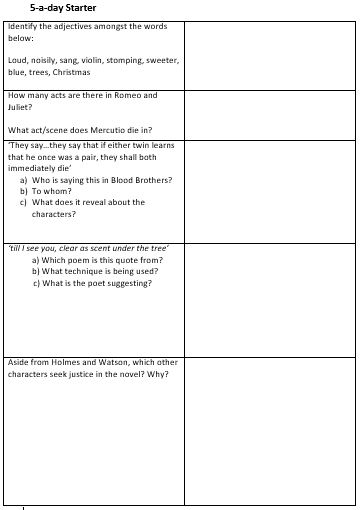
So my year 11 classes have been doing one of these at the beginning of every lesson for a term now and I’ve noticed that their confidence has absolutely soared, particularly amongst my lower ability set, who love the routine of it and actually really enjoy pushing themselves to remember details. They will often say, ‘that’s like in the starter we did’ or cross match something they have been reminded of in one text to another and crucially, I have seen ideas from the starters in their writing. So that for me, has been something that has worked.
The other thing that I needed to get them doing, was learning quotes. Whether anyone likes this or not, it is an essential part of the new GCSE. I was in perhaps the fortunate position of having taught closed-book literature for a few years, and our students had always performed pretty well in it, which makes me wonder whether closed book actually forces students to have a better understanding of the text, but that’s a whole other argument. The way that I have always used to help students learn quotes was a version of the dual coding technique…so along these lines:
Students would learn the quotes for homework and then they were tested on the quotes, the following week. Works really well, students learnt the quotes and again the lower ability in particular thrived on this idea. My only issues here are that a) I’m doing a lot of work and b) I’m giving them the quotes I want them to learn and with a top set year 10 coming on the heels of these, it made me think about giving students more autonomy in the quotes that they learn.
Students also love Kahoot, and I used that to my advantage. So here, for example, students learn the chapter titles for Sign of Four for homework and the following week were assessed using Kahoot. Each student signed in and I could clearly see who had learnt them and who hadn’t…and they loved the competition of it.
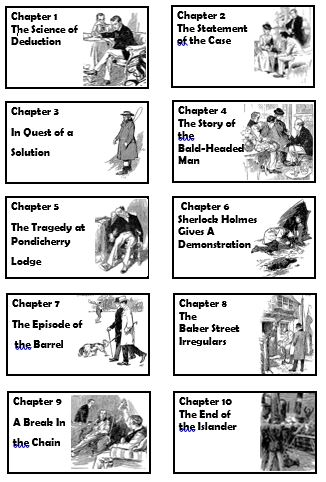
So year 11 is ticking along, I have seen improvements in their writing using these strategies, but still I had the rumbling sense that the curriculum map was not conducive to helping students to learn, to feel confident enough that when those 8 hours of exams hit them at the end of year 11, they knew everything that they needed to. So my mind turned towards year 10. I have a top set year 10 and a 2-7 group (I ignore 2 targets by the way, everyone in my classes is aiming for at least a 5.) I had read a lot of ideas and blogs about interleaving, spacing and retention strategies and made it my mission to become more informed. In particular, I have been really struck by the ideas of The Learning Scientists (@AceThatTest) who make all this sound pretty obvious. Their blog is full of useful material, including downloadable material on interleaving, spaced practice, retrieval practice, all of which is useful to teachers, parents and students.
So I was really interested to attend ResearchEd English and MFL in Oxford a few weeks ago, and in particular, hear Amy Forrester (@amforrester1) talk about how she had used research to rise to the challenges of the new GCSEs. Her talk was exactly what I needed to push myself to have a go at implementing what I knew was right. Amy’s research was just what I needed to hear and is well worth a read. So I decided to properly give this a go and put ideas into practice. First, a bit of research…
I’ve been reading 2 books that are completely changing the way I think. These may be books that many have read, but they are making me reconsider, after 15 years in education, how students learn, and how I can most help them to retain that knowledge.
Over the last few weeks, I have read some great blogs explaining how they have implemented these ideas. The wonderful Dawn Cox (@MissDCox) first got me thinking about how a curriculum and lessons could be designed with the idea of memory and retention at the heart. This is a great place to start with Dawn, but a trawl through her blog will show how she implements ideas within her lesson.
David Didau has written extensively on this subject, both in his book, What if Everything You Knew About Education was Wrong? and on his blog here.
Damain Benney (@Benneypenyrheol) was good enough to point me in the direction of the work that he has been doing, which I found both helpful and fascinating:
https://mrbenney.wordpress.com/2016/10/16/trying-to-apply-spacing-in-science/
https://mrbenney.wordpress.com/2016/11/03/optimal-time-for-spacing-gaps/
https://mrbenney.wordpress.com/2017/03/26/revision-practising-what-i-preach-retrievedonthighlight/
After putting out a request on Twitter @MissWood_Towers really helpfully linked me to these that are also hugely useful:
https://www.scientificamerican.com/article/the-interleaving-effect-mixing-it-up-boosts-learning/
https://classteaching.wordpress.com/2014/06/12/spacing-and-interleaving/
@judehunton linked me to the Dunlosky article here
I’d also like to thank @ralston_h for the really useful ideas and help that she gave me.
Twitter is a grand place for support when you have an inkling of an idea.
So what have I done, apart from read a fair bit and drink endless cups of coffee? First of all, I completely nicked Kate McCabe’s (@evenbetterif) idea for my year 11s Easter revision.
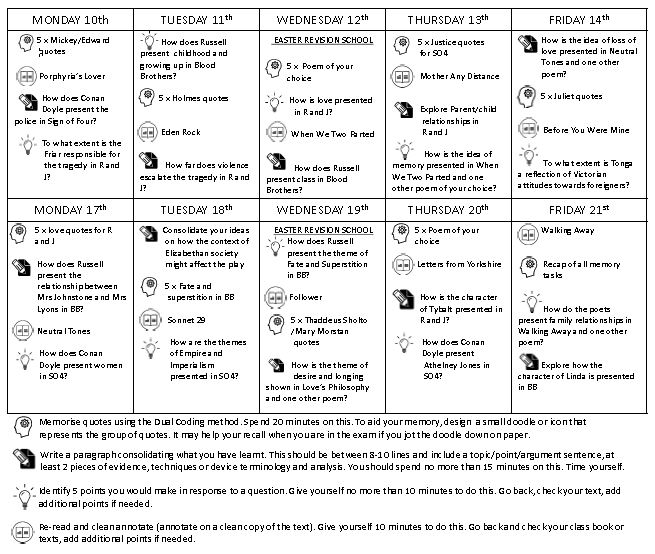
Kate skilfully put into practice everything that we had learnt from the ResearchEd conference – short sharp focused tasks. I simply adapted for the texts I taught and gave my year 11s a choice of tasks for each day of the holidays, so even if they did them all, they would only need to spend an hour of their day doing them. The students have really taken to this idea, as their emails in the holidays have delightfully informed me!
Kate’s original document is here….she is a genius at resource making.
And while year 11 are busy revising, my mind has turned to year 10 and what I am going to do now, to boost their confidence in the texts and make sure that they are retaining everything they need to. So here’s what I’ve planned…
I’ve tried to look at how I can interleave this Summer term. Students have already studied Jekyll and Hyde and have just started Romeo and Juliet. They also did a Language mock in January and will do a Lit Paper 1 mock sometime after half term, probably mid half term when the exams have calmed down, but an actual date is not in place yet. It doesn’t matter if Romeo and Juliet isn’t finished by then, as we will write the mock so that it is an extract that they have covered and they can use what they already know.
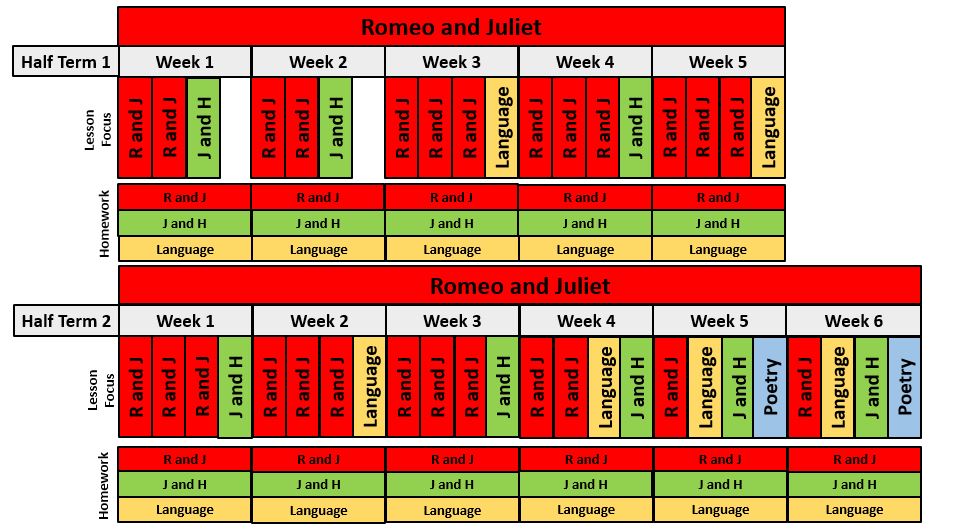
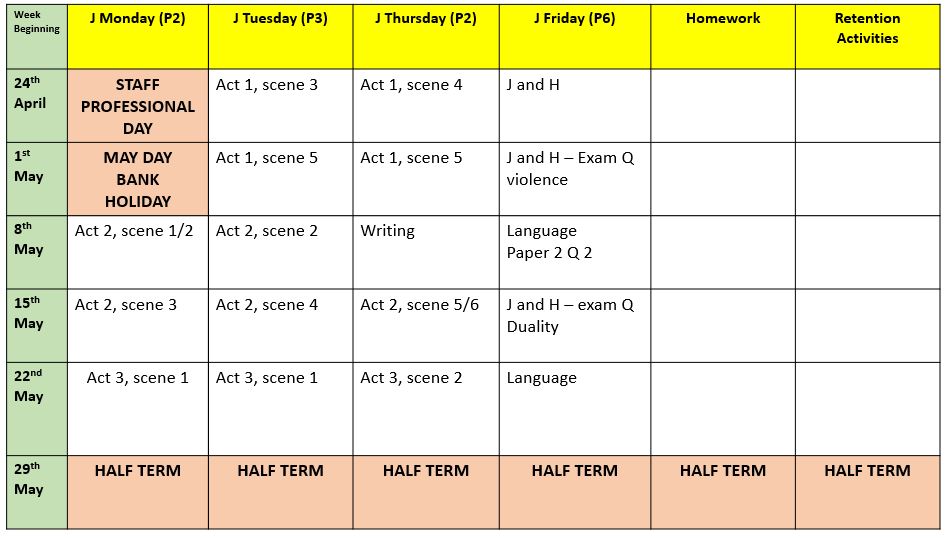







Great work, Becky. Amazing amounts of it too. You’re a consummate professional. Just remember, as always, that not everything has to be achieved yesterday. Look after yourself too so that you can keep making the amazing difference you make long into the future.
LikeLike
Thanks JL. It’s sometimes hard not to want to let a single student down when you’ve realised that things aren’t quite right…but hey, this one needs to be a long and considered one.
LikeLike
So inspired by this!! You have put into one beautifully written, accessible piece, all the things I’ve been trying to get my head around. I’m an NQT and will be (hopefully) taking my 9s into 10 next year, when they will sit their Lit. I’m just trying to get myself through to the the end of this year getting to know the texts as well as I can, but I can’t wait to tweak and prepare all this info over summer in prep for next year. I feel the same as you, I just want to give my kids the absolute best deal – whether they like it or not! 🙂
Big thanks for all the hard work you’ve obviously put into this! Xxx
LikeLike